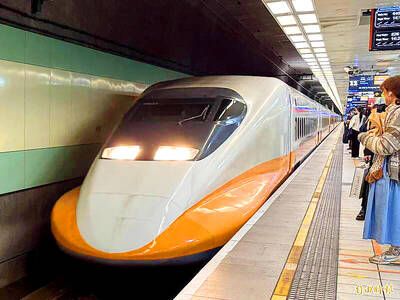Though the number of animal rights activists in Taiwan is increasing, few can match the Environment and Animal Society of Taiwan (EAST) in its efforts to care not only for common pets like cats and dogs, but to protect the rights and welfare of all types of animals.
The EAST’s accomplishments include promoting the passage of humane livestock slaughter legislation, better management of animal breeding and marketing, making documentaries on controversial issues such as Hong Kong’s fur trade and how “divine pigs” (神豬) used in religious rituals are fattened up and abused.
All these efforts have been attributed to the dedication of the group’s founder and executive director, Chu Tseng-hung (朱增宏), also known by his Buddhist name, Wu Hung.

Photo: Chen Wei-tzu, Taipei Times
Chu has spent some time as a monk, before deciding to return to secular life. Though he sidestepped the question of why he left the order, citing privacy, Chu was eloquent when speaking about his experience in getting involved in the animal rights movement.
“My master said that the issue needed more promotion, so I, along with some lawyers, entrepreneurs and teachers, started the Life Conservationalist Association, an organization whose members consisted mainly of Buddhist followers,” Chu said in a recent interview.
To better understand social activism, Chu also completed a master’s program at Shih Hsin University’s Graduate Institute for Social Transformation Studies.
The association was a major proponent of the movement that led to the passage of the Animal Protection Act (動物保護法) in 1998, with the group launching a petition that collected more than 100,000 signatures in support of the act.
Chu worked as the association’s secretary-general for six years before he left and founded the EAST, an organization mainly concerned with the protection of “economic animals,” such as pigs, cows, sheep, chickens and ducks.
The protection of these animals is easily overlooked because they are mainly raised for economic gain, Chu said, adding that it was hard because it meant changing human eating habits.
While Chu places a high value on being vegetarian, he realizes that it is difficult to ask others to completely change their eating habits, so he chose to focus on promoting a more humane way of slaughtering livestock.
“The way pigs were killed for their meat was very cruel as the butcher would simply slash the pig’s throat. The pig would be in great pain until it bled dry, or placed in boiling water while it was still bleeding,” Chu said.
Cows were also butchered by using axes, he added.
“These animals also feel pain, just as a human being would,” Chu said.
However, Chu was aware that moral preaching would accomplish nothing, so he and four group members spent three years conducting field research.
They visited slaughterhouses across the nation and compiled reports on the transportation and killing of animals.
The EAST’s efforts drew the attention of the media. Subsequent media reports sparked a public call for action, putting pressure on the government to implement changes.
Though it took seven years, Chu and the EAST finally persuaded the government to establish more humane standards, such as mandating that pigs and cows either be shot, or butchered after they are rendered unconscious through electrocution.
However, the group’s work does not end there, Chu said.
The EAST has to continuously monitor to see whether the law is implemented.
If the government is lax in enforcing the law, then the EAST would take legal action against it, Chu said.
Another way to ensure that the law is enforced is to draw on consumer support, he said.
It has been more than a decade since the Animal Protection Act was passed, and it needs to be reviewed and amended, Chu said, adding that Britain, Hong Kong and New Zealand had all made legislative changes to better protect animal welfare.
“Animal protection is not limited to saving them from harm, but also focusing on their basic needs, which include freedom from starvation, discomfort, pain, disease and fear,” Chu said.
Animal owners also needed to understand the concept of animal welfare, he said.
For instance, many pet owners put shoes on their dogs, but that is wrong because the shoes prevent dogs from trimming their nails, as well as prevent them from perspiring through their paws, Chu said.
While the owners may think they are showing their pets love and concern, such actions go against the natural needs of their pets and harm them, Chu said.
Unlike other animal protection and welfare groups which have big plans for the future, the EAST’s ultimate goal is to self-disband in about two or three decades, because that would mean that animal welfare has matured in Taiwan and no longer needs supervision, Chu said.

A 72-year-old man in Kaohsiung was sentenced to 40 days in jail after he was found having sex with a 67-year-old woman under a slide in a public park on Sunday afternoon. At 3pm on Sunday, a mother surnamed Liang (梁) was with her child at a neighborhood park when they found the man, surnamed Tsai (蔡), and woman, surnamed Huang (黃), underneath the slide. Liang took her child away from the scene, took photographs of the two and called the police, who arrived and arrested the couple. During questioning, Tsai told police that he had met Huang that day and offered to

LOOKING NORTH: The base would enhance the military’s awareness of activities in the Bashi Channel, which China Coast Guard ships have been frequenting, an expert said The Philippine Navy on Thursday last week inaugurated a forward operating base in the country’s northern most province of Batanes, which at 185km from Taiwan would be strategically important in a military conflict in the Taiwan Strait. The Philippine Daily Inquirer quoted Northern Luzon Command Commander Lieutenant General Fernyl Buca as saying that the base in Mahatao would bolster the country’s northern defenses and response capabilities. The base is also a response to the “irregular presence this month of armed” of China Coast Guard vessels frequenting the Bashi Channel in the Luzon Strait just south of Taiwan, the paper reported, citing a

A total lunar eclipse, an astronomical event often referred to as a “blood moon,” would be visible to sky watchers in Taiwan starting just before midnight on Sunday night, the Taipei Astronomical Museum said. The phenomenon is also called “blood moon” due to the reddish-orange hue it takes on as the Earth passes directly between the sun and the moon, completely blocking direct sunlight from reaching the lunar surface. The only light is refracted by the Earth’s atmosphere, and its red wavelengths are bent toward the moon, illuminating it in a dramatic crimson light. Describing the event as the most important astronomical phenomenon

BETTER SERVICE QUALITY: From Nov. 10, tickets with reserved seats would only be valid for the date, train and route specified on the ticket, THSRC said Starting on Nov. 10, high-speed rail passengers with reserved seats would be required to exchange their tickets to board an earlier train. Passengers with reserved seats on a specific train are currently allowed to board earlier trains on the same day and sit in non-reserved cars, but as this is happening increasingly often, and affecting quality of travel and ticket sales, Taiwan High-Speed Rail Corp (THSRC) announced that it would be canceling the policy on Nov. 10. It is one of several new measures launched by THSRC chairman Shih Che (史哲) to improve the quality of service, it said. The company also said